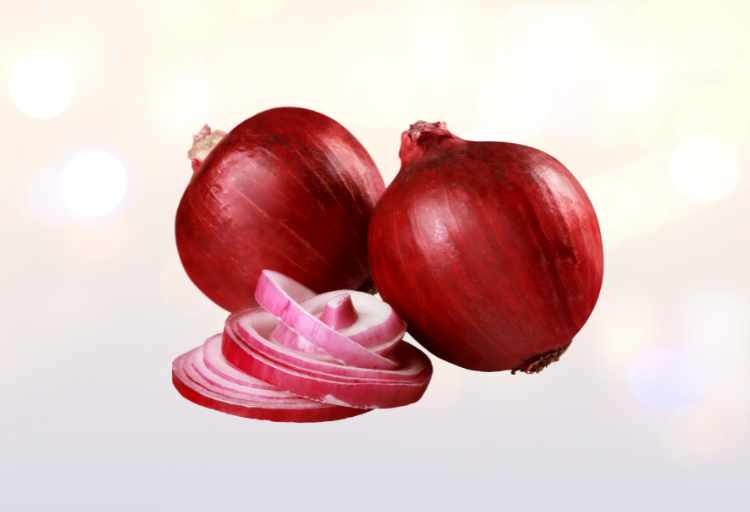7 Best Onion Substitutes
Looking for the best onion substitutes to add flavor and depth to your dishes? Look no further! Whether you’re out of onions or simply looking to switch things up, there are plenty of delicious alternatives that can elevate your recipes.
Shallots, with their mild and sweet flavor, make a fantastic substitute for onions in sauces and dressings. If you prefer a more pungent taste, garlic is your go-to option – it adds a distinct kick to any dish.
Leeks are another excellent choice, offering a milder onion-like flavor that works well in soups and stews. For a subtle yet refreshing twist, scallions and chives provide the perfect balance of flavors.
And if you’re after some crunchiness, celery, and fennel can step up as worthy substitutes too! With these versatile options at your disposal, you’ll never have to worry about running out of onions again.

What Are The Best Onion Substitutes?
1. Shallots
Shallots, the elegant and delicate cousin of onions, make for a tantalizing substitute in any dish. Cooking techniques with shallots are similar to those used with onions. You can chop, mince, or slice them to add flavor to your favorite recipes.
Shallots have a milder and sweeter taste compared to onions, making them perfect for dishes that require a subtle onion flavor. Besides their culinary appeal, shallots also offer health benefits.
They’re rich in vitamins A and C, as well as minerals like potassium and calcium. These nutrients contribute to boosting your immune system and promoting healthy bones.
Additionally, shallots contain antioxidants that may help reduce inflammation and lower the risk of chronic diseases. Next time you’re out of onions, don’t fret – reach for some shallots instead!
2. Garlic
Although garlic may not be the most popular choice, its bold and pungent flavor can bring tears of joy to any dish. Not only does garlic add a unique taste, but it also offers several health benefits when used as a substitute for onions.
Garlic is known for its antibacterial and antiviral properties, helping to boost your immune system. It also contains antioxidants that fight against free radicals in the body.
When cooking with garlic as an onion substitute, there are a few techniques you can try. First, finely mince the garlic to release its full flavor.
You can sauté it in oil or butter before adding other ingredients to enhance its taste further. Additionally, roasting garlic brings out a milder and sweeter flavor that complements many dishes perfectly.
So next time you’re missing onions, don’t hesitate to reach for some delicious garlic instead!
3. Leeks
If you’re craving a milder and slightly sweet flavor in your dishes, leeks are a fantastic choice to add depth and richness to your meals. Here are three reasons why you should consider using leeks as an onion substitute:
- Leek and Potato Soup: This classic dish combines the earthy sweetness of leeks with creamy potatoes for a comforting bowl of goodness.
- Roasted Chicken with Leeks: Tossing chicken with sliced leeks, olive oil, and spices before roasting creates a flavorful and juicy main course.
- Leek Quiche: Swap out onions for leeks in this savory pastry dish for a distinct and delicate taste.
Not only do leeks bring wonderful flavors to your recipes, but they also offer numerous health benefits. They’re packed with vitamins A, C, and K while being low in calories. Additionally, their high fiber content aids digestion.
So next time you’re looking for an alternative to onions, give leeks a try!
4. Scallions
Looking to add a burst of freshness and color to your dishes? Scallions are the perfect ingredient to elevate your meals with their vibrant green hue and mild onion flavor.
In Asian cuisine, scallions are widely used for their versatility. They can be thinly sliced and added as a garnish to soups, stir-fries, and noodle dishes, providing a subtle onion taste without overpowering the other flavors. Scallions also serve as a key ingredient in sauces like soy-based dipping sauces or spicy salsas.
If you’re interested in growing scallions in your home garden, it’s quite simple! Start by purchasing scallion seedlings from a local nursery or online store. Plant them in well-draining soil with plenty of sunlight.
Regularly water them to keep the soil moist but not overly saturated. Within a few weeks, you’ll have fresh scallions ready for harvest! Remember to trim them from the base rather than pulling them out completely so they can regrow for future use.
Enjoy the convenience of having these versatile greens readily available for all your culinary adventures!
5. Chives
Chives, with their delicate and subtle flavor, provide a touch of elegance to any dish. These slender green herbs are commonly used in culinary creations to add a mild onion-like taste without overpowering the other ingredients.
Chopped chives make a wonderful garnish for soups, salads, and baked potatoes. They also enhance the flavors of creamy dips, omelets, and quiches.
Apart from their culinary uses, chives offer several health benefits too. They’re rich in vitamins A and C, which help boost your immune system and promote healthy skin.
Additionally, they contain antioxidants that may aid in reducing inflammation and preventing chronic diseases.
So next time you’re looking for an onion substitute that adds sophistication to your meals while providing nutritional value, reach for some fresh chives!
6. Celery
Celery, with its crisp texture and subtle flavor, adds a refreshing crunch to salads and soups while providing numerous health benefits. As an onion substitute, celery brings its own unique flavors to dishes, creating a delicious twist on traditional recipes.
Here are five reasons why using celery instead of onions can be a healthy choice:
- Low in calories: Celery is a great option for those watching their calorie intake.
- High in fiber: This vegetable aids digestion and keeps you feeling full for longer periods.
- Rich in vitamins: Celery contains vitamins A, C, and K which help boost your immune system.
- Natural diuretic: Celery helps flush out toxins from your body due to its high water content.
- Anti-inflammatory properties: The antioxidants found in celery help reduce inflammation in the body.
So next time you’re looking for an alternative to onions, give celery a try! Your taste buds and your health will thank you.
7. Fennel
Fennel, known for its unique licorice-like flavor and versatility in recipes, offers a delightful twist to traditional dishes while providing numerous health benefits.
In terms of history and culinary uses, fennel has been used as an onion substitute in various cuisines for centuries. Its bulb, stalks, and fronds can all be utilized in cooking.
The bulb can be sliced thinly and sautéed or roasted to add a subtle sweetness and crunch to dishes like stir-fries or salads.
The stalks can be chopped and used as a base for stocks or soups, imparting a mild anise flavor. Additionally, the feathery fronds make for a beautiful garnish or herbaceous addition to dishes.
To incorporate fennel into recipes as a flavorful alternative to onions, try using it raw in salads for added texture and taste or finely chop it to use as a seasoning in marinades or dressings.
With its distinct flavor profile, fennel brings depth and complexity to any dish while replacing the pungency of onions with its own subtle sweetness.
Conclusion
In conclusion, when you’re in need of an onion substitute, there are several options to choose from. Shallots, garlic, leeks, scallions, chives, celery, and fennel can all be used to add flavor and depth to your dishes.
Whether you’re looking for a milder or more intense onion flavor, these alternatives are sure to satisfy your culinary needs. So next time you’re out of onions, don’t worry – these substitutes got you covered!
